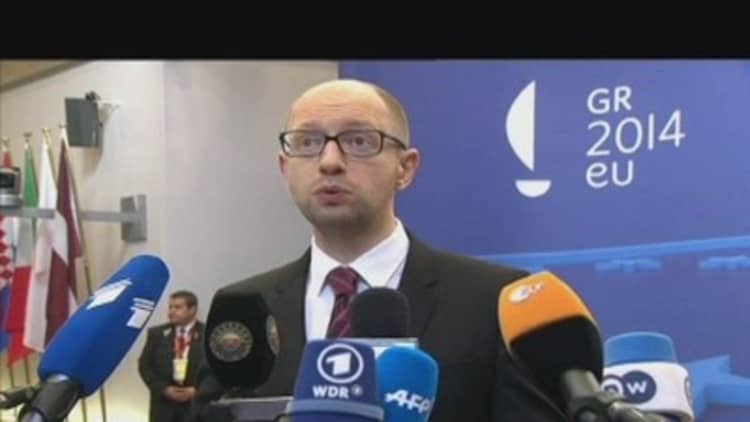Leaders of the G-7 nations are to hold talks on the sidelines of a nuclear security summit in The Hague on Monday to consider their response to Russia annexing Crimea, amid doubts that sanctions can constrain President Vladimir Putin.
Since the emergency one-hour meeting was announced last Tuesday, Putin has signed laws completing Russia's annexation of the peninsula on the Black Sea and his troops seized a Ukrainian airbase there.
(Read more: Another Crimea? Ukraine's neighbor asks to join Russia)
In what has become the biggest confrontation between the East and West since the Cold War, the United States and the European Union have imposed sanctions targeting some of his closest political and business allies, but it was unclear whether they went far enough to influence Moscow.
At The Hague, the G-7 will probably discuss how to exert further pressure and at what potential cost.
"It will be an opportunity for us to explain to each other what we are doing and where we are going, to coordinate our actions," a senior EU official said.
Western governments are struggling to find a balance between putting pressure on Putin, protecting their own economies and avoiding triggering a vicious cycle of sanctions and reprisals.
Dutch Prime Minister Mark Rutte, who is making his residence available to U.S. President Barack Obama and the leaders of Germany, Britain, Canada, France, Japan and Italy for the talks, said the West might want to move slowly.
"Russia has an economy that is highly focused on oil and gas," Rutte told Reuters. "It is not diversified ... If it came to putting in place sanctions, that would hurt Russia considerably. So in my view we should do everything to prevent that."
(Read more: We're broke but we won't default: Ukrainian FinMin)
U.S. officials say any further sanctions will need to be carefully calibrated to avoid bans on entire sectors, like oil or metals, that could reverberate through the global economy. Europe gets around one-third of its oil and gas from Russia.
British Foreign Secretary William Hague said in an article on Saturday, however, that Britain and its allies should consider imposing lasting limitations on arms sales to Russia, following the "outrageous" annexation of Crimea.
Diplomats said it was unlikely any detailed decisions about sanctions would be taken at the meeting, due to start at 6.30 p.m. (1730 GMT), although the group is likely to send a message of support for Kiev, particularly referring to Ukraine's battered economy.

Group of eight
NATO's top military commander said on Sunday that Russia had built up a "very sizable" force on its border with Ukraine and may have a region in another ex-Soviet republic, Moldova, in its sights.
Also on the agenda will be the upcoming meeting of G8 nations in the Russian Black Sea resort of Sochi in June when Moscow is due to take over the rotating G8 presidency.
The G-7 leaders have suspended preparations for that and Britain has warned that Russia could face permanent exclusion from the group if it takes further steps against Ukraine.
Russia became the eighth member of the elite group of industrialized nations in 1998, after trying to gain full membership since its inception in 1975.
(Read more: Ukraine crisis means EU-US trade talks a priority)
A French diplomatic source said the leaders will "discuss how this group can or cannot continue to function".
"There will certainly be a statement published at the end which will reflect the consensus on the evaluation of the situation and on how this group can respond to the situation created in Ukraine," the source said, on condition of anonymity.
Losing its G8 place would be embarrassing to Putin and a major departure for the West in its efforts to draw Russia into its policymaking efforts.
"The G8 is dead, though I don't think anybody wants to say that," one EU diplomat said, speaking on condition of anonymity. "The point that everybody will want to make is that we are all united."

